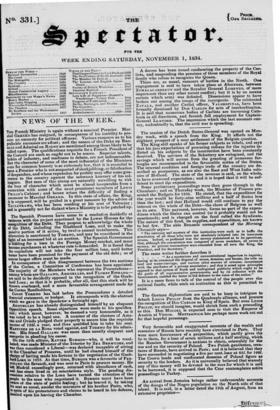The session of the Dutch States-General was opened on Mon-
day week, with a speech from the King. It affords not the slightest prospect of a near settlement of the Belgian question.
The King still speaks of his former subjects as rebels, and says that his just expectations of procuring redress for the injuries in-
flicted on his subjects by the insurrection have been constantly deceived. The services of the Schuttery are eulogized, and the savings which will accrue from the granting of numerous fur- loughs are recommended to the favourable notice of the States. The internal condition and foreign trade of the country are de- scribed as prosperous, as are also the East and West India colo- nies of' Holland. The state of the revenue is said, on the whole, to have answered expectation; and it is hoped that it will be suf- ficient to meet tlje expenditure.
Some preliminary proceedings were then gone through in the Chambers; and on Thursday week, the Minister of Finance pre- sented the Budgets for 1835. He stated, that the expenditure for the year would be forty-nine millions and a half of florins less than the last ; and that Holland would still continue to pay the interest on the whole of the Debt—the share of Belgium as well as its own. This payment, however, forms no part of the expen- diture which the States can control (or it probably would not be sanctioned); and is charged on the fund called the Syndicate. The nature of this fund, its supplies, and expenditure, are known to but few. The able Brussels correspondent of the Morning chronicle says- " The intricacy and mystery of this institution were such as to baffle the penetration of all those who were not absolutely initiated into its innermost arcana, linked, so profound was the secrecy maintained as to its operations, that, although the commission was composed of seven members, all sworn to secrecy, its private transactions were concealed from all save the King, the President, and his Secretary."
The same writer further describes it
. . . . " As a mysterious and unconstitutional imperium in imperio; having at its command the disposal of mines, domains, and forests, the tolls on land and water-carriage, and various other sources of revenue, inconsistent with the attributes of a private association ; and that it acted upon principles opposed to that system of frank and undisguised publicity which ought to be the guide of all representative governments, and by its collusion with the Government, enabled the latter to bid defiance to the voice of the nation."
It is a mere farce to talk of the control of the people over the national funds, while such an institution as this is permitted to exist.


























